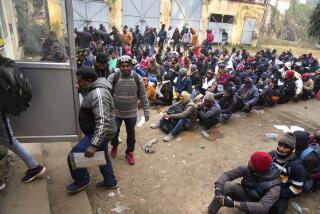India, Pakistan Agree on Kashmir Bus Service
- Share via
ISLAMABAD, Pakistan — In a significant step toward peace in Kashmir, India and Pakistan agreed Wednesday to start a bus service linking the two sides of the territory, which has been divided by more than half a century of conflict.
The breakthrough brought fresh momentum to a year-old peace process that had shown little progress in resolving the dispute over the Kashmir region, a former “princely state” torn apart by rival Indian and Pakistani claims after Britain withdrew from the subcontinent in 1947.
The bus service will begin April 7 and run from Srinagar, the summer capital of Indian-held Kashmir, to Muzaffarabad, capital of Pakistani-controlled Kashmir, the countries’ foreign ministers announced at a joint news briefing.
It will allow thousands of Kashmiri families divided by a heavily fortified cease-fire line to reunite for the first time since the territory was split between India and Pakistan in 1948.
The announcement came after Indian Foreign Minister Natwar Singh met here with Pakistani President Pervez Musharraf and other top officials. Singh is the first Indian foreign minister to hold direct talks in Pakistan since 1989.
The announcement drew a mixed reaction from Indian-controlled Kashmir, where separatist leaders such as Ashraf Sehrai said the bus service would not solve the core political dispute that has caused decades of bloodshed.
But ordinary Kashmiris such as Raja Mohammed Hussain Khan said they were eager to see relatives who lived in Pakistani Kashmir.
“I wish I could travel to Muzaffarabad again and meet my sons and daughters,” said Khan, who is 90.
“I pray to Allah that I should be kept alive till I will meet my kin.”
India and Pakistan declared a cease-fire in November 2003 along the so-called Line of Control that divides the territory, but accused each other of violating the truce last month.
Though still a long way from resolving the complex dispute, opening the de facto border to bus traffic is expected to help defuse tensions.
Mufti Mohammed Sayeed, the elected chief minister of Indian-controlled Jammu and Kashmir state, called the bus deal the boldest step India and Pakistan had taken since independence.
“This will not only open a road,” he said. “This will open the hearts and minds of the people living on both sides of the Line of Control. It will have tremendous economic benefits and it will have social benefits. It will remove the cobwebs of misunderstanding between the people on either side of the Line of Control.”
Mian Khursheed Mehmood Kasuri, the Pakistani foreign minister, said his government had impressed upon India the need to find a solution in accordance with the aspirations of Kashmiris. But his Indian counterpart, Singh, did not mention the dispute during their joint appearance in front of reporters, who were not allowed to ask questions.
Singh stressed the need to build trust between the two nations before they could address difference more productively.
Despite a cease-fire with Pakistan, India continues to battle insurgents in its part of Kashmir. The militants, estimated to number several thousand, have strong support from many Pakistanis, who see them as freedom fighters.
The Kashmir bus service was proposed last year, but got bogged down in a dispute over what kind of travel documents passengers could use.
To support its stand that the state of Jammu and Kashmir is part of India, New Delhi insisted that travelers would have to show passports and visas. The Pakistani government pressed for a compromise to back its position that the Line of Control could not become an international border.
Wednesday’s agreement will set up “an entry permit system,” said a joint statement issued by Singh and Kasuri.
The two sides also agreed to hold talks on several other proposals, including efforts to reduce the risk of nuclear weapons being launched accidentally or without authorization.
They are also negotiating a pipeline to bring natural gas from Iran to India through Pakistan. Singh said that an agreement was possible if Pakistan provided security and could assure delivery of fuel to India.
A bus service between the Indian city of Amritsar and the Pakistani city of Lahore is also being discussed.
Zaidi reported from Islamabad and Tak from Jammu, India.
More to Read
Sign up for Essential California
The most important California stories and recommendations in your inbox every morning.
You may occasionally receive promotional content from the Los Angeles Times.













